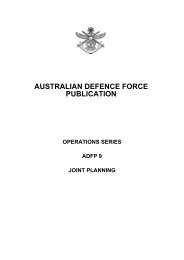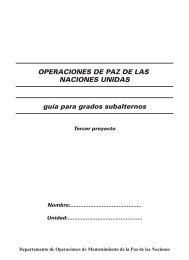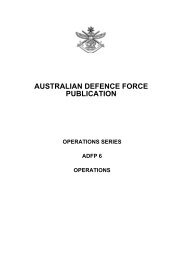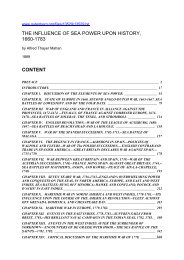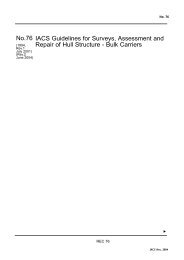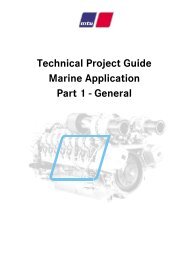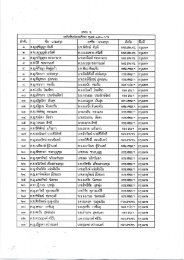The Greek Effort to Implement Vessel Traffic Services
The Greek Effort to Implement Vessel Traffic Services
The Greek Effort to Implement Vessel Traffic Services
Create successful ePaper yourself
Turn your PDF publications into a flip-book with our unique Google optimized e-Paper software.
INTERNATIONAL HYDROGRAPHIC REVIEW May 2009<br />
Management of the vessels’ traffic and the<br />
adoption of rules for mutual sharing of<br />
information contributes <strong>to</strong> the prevention of<br />
accidents and pollution and <strong>to</strong> the minimization<br />
of the consequences <strong>to</strong>wards the marine and<br />
coastal environment, the economy and the health<br />
of the regional communities.<br />
In order <strong>to</strong> ensure the freedom of navigation, the<br />
<strong>Vessel</strong> <strong>Traffic</strong> <strong>Services</strong> (VTS) is developed, only<br />
in areas of special interest. <strong>The</strong> VTS centre has<br />
the task of communicating directly and<br />
interacting with the vessels that pass through its<br />
area of responsibility, providing solutions <strong>to</strong> any<br />
safety problems that might arise. <strong>The</strong> installation<br />
of VTS centres is normally the responsibility of<br />
the Sea Port Authorities of a given country,<br />
which are charged with the task of overseeing the<br />
implementation of the regulations of maritime<br />
traffic, in a manner parallel <strong>to</strong> that of air traffic<br />
controllers. In detail, these centres are responsible<br />
for the provision of:<br />
• Information <strong>Services</strong>. <strong>The</strong> provision of<br />
information of maritime interest. <strong>The</strong><br />
relevant information provided primarily<br />
relates <strong>to</strong> the positioning of another vessel,<br />
the identity of a certain vessel, a sudden<br />
change in the destination or the planning of<br />
a trip, weather and sea conditions .<br />
Additionally, the centre can interact with a<br />
specific vessel in order <strong>to</strong> clarify any<br />
omissions in the data provided in advance<br />
by the ship’s owner or the ship master.<br />
• Provision of Maritime Assistance <strong>Services</strong>,<br />
the provision of services of importance in<br />
cases of adverse weather conditions,<br />
navigational difficulties, or malfunction of<br />
vessel equipment, under the precondition<br />
that the centre will at all times oversee the<br />
operations so that it can be in a position <strong>to</strong><br />
assist the vessel’s master in making the<br />
correct decision.<br />
• <strong>Traffic</strong> Organization <strong>Services</strong>, the<br />
operational management of traffic, priority<br />
of passage or access <strong>to</strong> ports or zones and<br />
the overall planning for the movement of<br />
vessels, with the aim of reducing traffic<br />
congestion.<br />
<strong>The</strong> effectiveness of any external intervention <strong>to</strong><br />
the management of maritime traffic, and<br />
especially in the management of the access of<br />
vessels <strong>to</strong> ports, depends on the information<br />
provided by the owner of the ship, which has <strong>to</strong><br />
be submitted in sufficient time before the vessel’s<br />
arrival <strong>to</strong> the port. It may be noted that during a<br />
vessel’s transit through a VTS area, the vessel is<br />
obliged <strong>to</strong> abide by the rules and regulations as<br />
well as any special regulations promulgated by<br />
the relevant port authorities, maintain open<br />
frequencies for radio contact and report any<br />
deviation from the agreed course. <strong>The</strong> reporting<br />
of passing vessels has <strong>to</strong> be submitted <strong>to</strong> a VTS<br />
centre, it is distinguished in the initial reporting,<br />
the entry/departure reporting, the final reporting,<br />
the intermediate reporting, the corrective and<br />
finally extraordinary reporting. <strong>The</strong> initial<br />
reporting, for example, is made 15 minutes before<br />
a vessel’s entry <strong>to</strong> a VTS area and not earlier than<br />
30 minutes before entry and it includes besides<br />
information on the vessel’s identity and<br />
destination, information on the type of cargo –<br />
especially when the vessel is carrying hazardous<br />
cargo- and the quality and quantity of fuel or any<br />
oil residues. Information on matters such asthe<br />
type of cargo of the cargoin a vessel that passes<br />
through a coastal area is of particular importance<br />
<strong>to</strong> the coordination and the successful<br />
implementation of a salvage operation or a spill<br />
response.<br />
IV. Analyzing the <strong>Greek</strong> <strong>Effort</strong> in Sea <strong>Traffic</strong><br />
Management<br />
A considerable proportion of the world’s energy<br />
resources –mainly oil and natural gas passes<br />
through the Mediterranean (Dalaklis and<br />
Siousiouras, 2006) and also through the Aegean<br />
Sea. It is from this particular maritime area –<br />
either by oil tankers or through a combination of<br />
pipelines and medium or large tankers- that the<br />
entire trade of energy resources coming from the<br />
Caspian Sea and Russia is being transported. This<br />
trend is expected <strong>to</strong> continue <strong>to</strong> grow after the<br />
completion of the Burgas-Alexandroupoli<br />
pipeline. Greece’s National <strong>Vessel</strong> <strong>Traffic</strong><br />
Management and Information System (VTMIS)<br />
constitutes an integrated system for the electronic<br />
control of sea traffic, built initially <strong>to</strong> provide<br />
VTS <strong>to</strong> a particular area within Greece’s<br />
terri<strong>to</strong>rial waters, with the aim of improving sea<br />
traffic and protection of the marine environment.<br />
<strong>The</strong> Ministry of Mercantile Marine (MMM), in<br />
the context of a modernization policy that is<br />
under way, promotes the development of an<br />
integrated electronic informational system for the<br />
control of maritime traffic, which in it full<br />
38_________________________________________________________________________



